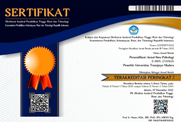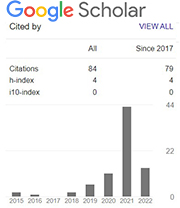Family Influence and Career Adaptability: The Mediating Role of Future Time Perspective
Abstract
Keywords
Full Text:
PDFReferences
Abduh, R. (2020). Dampak sosial tenagakerja asing (tka) di indonesia. Sosek: Jurnal Sosial dan Ekonomi, 1(1), 25- 28. https://doi.org/10.55357/sosek.v1i1.24
Adel, A. (2022). Future of industry 5.0 in society: human-centric solutions, challenges, and prospective research areas. Journal of Cloud Computing, 11(1), 1-15. DOI:10.1186/s13677-022-00314-5
Afifah, R. N., & Salim, R. M. A. (2021). Peran mediasi perilaku eksplorasi karier dalam pengaruh dukungan teman terhadap adaptabilitas karier mahasiswa. Journal of Psychological Science and Profession, 4(3), 197-209. https://doi.org/10.24198/jpsp.v4i3.29241
Alexander, A. V. (2021). Hubungan antara kecerdasan emosi dengan adaptabilitas karier pada mahasiswa tingkat akhir. (Skripsi). Fakultas Psikologi Universitas Mercu Buana Yogyakarta: Yogyakarta
Bain, P. G., Milfont, T. L., Kashima, Y., Bilewicz, M., Doron, G., Garðarsdóttir, R. B., & Saviolidis, N. M. (2016). Co-benefits of addressing climate change can motivate action around the world. Nature climate change, 6(2), 154-157. 10.1038/nclimate2814
Baluku, M. M., Mugabi, E. N., Nansamba, J., Matagi, L., Onderi, P., & Otto, K. (2021). Psychological capital and career outcomes among final year university students: the mediating role of career engagement and perceived employability. International Journal of Applied Positive Psychology, 6(1), 55–80.DOI:10.1007/s41042-020-00040-w
Badan Pusat Statistik. (2022).Tingkat pengangguran terbuka (tpt) sebesar 5,86 persen dan rata-rata upah buruh sebesar 3,07 juta rupiah per bulan (https://www.bps.go.id/pressrelease/2022/11/07/1916/agustus-2022--tingkat-pengangguran-terbuka--tpt--sebesar-5-86-persen-dan-rata-rata-upah-buruh-sebesar-3-07-juta-rupiah-per-bulan.html)
Bi, X., & Wang, S. (2021). Parent-adolescent communication quality and life satisfaction: the mediating roles of autonomy and future orientation. Psychology Research and Behavior Management, 14, 1091–1099. https://doi.org/10.2147/PRBM.S317389
Bocciardi, F., Caputo, A., Fregonese, C., Langher, V., & Sartori, R. (2017). Career adaptability as a strategic competence for career development. European Journal of Training and Development, 41(1), 67–82. doi:10.1108/ejtd-07-2016-0049
Brown, S. D., & Lent, R. W. (Eds.). (2013). Career development and counseling: putting theory and research to work (Second Edition). Hoboken: John Wiley & Sons.
Christine, C., & Riasnugrahani, M. (2021). Hubungan antara dimensi calling dan career adaptability pada guru sma. Humanitas (Jurnal Psikologi), 5(2), 197–206. https://doi.org/10.28932/humanitas.v5i2.3732
Chen, S., Chen, H., Ling, H., & Gu, X. (2022). An online career intervention for promoting chinese high school students’ career readiness. Front. Psychol. 12:815076. doi: 10.3389/fpsyg.2021.815076
Chua, L. W., Milfont, T. L., & Jose, P. E. (2015). Coping skills help explain how future-oriented adolescents accrue greater well-being over time. Journal of youth and adolescence, 44, 2028-2041. DOI: 10.1007/s10964-014-0230-8
Di Maggio, I., Ginevra, M. C., Santilli, S., Nota, L., & Soresi, S. (2020). The role of career adaptability, the tendency to consider systemic challenges to attain a sustainable development, and hope to improve investments in higher education. Frontiers in Psychology, 11, 1926. doi: https://doi.org/10.3389/fpsyg.2020.01926
Fachri, D., Purna, R., & Rahayuningsih, T. (2022). Pengaruh perceived social support terhadap career adaptability pada mahasiswa psikologi universitas andalas yang berada di tahun akhir selama pandemi covid – 19. Jurnal Psikologi Tabularasa, 17(2), 97-106. doi: https://doi.org/10.26905/jpt.v17i2.8476
Fouad, N. A., Cotter, E. W., Fitzpatrick, M. E., Kantamneni, N., Carter, L., & Bernfeld, S. (2010). Development and validation of the family influence scale. Journal of Career Assessment, 18(3), 276-291. https://doi.org/10.1177/1069072710364793
Guan, Y., Wang, F., Liu, H., Ji, Y., Jia, X., Fang, Z., Li, Y., Hua, H., & Li, C. (2015). Career-specific parental behaviors, career exploration and career adaptability: a three-wave investigation among chinese undergraduates. Journal of Vocational Behavior, 86, 95–103. https://doi.org/10.1016/j.jvb.2014.10.007
Guan, Y., Wang, Z., Gong, Q., Cai, Z., Xu, S. L., Xiang, Q., Wang, Y., Chen, S. X., Hu, H., Tian, L. (2018). Parents’ career values, adaptability, career-specific parenting behaviors, and undergraduates’ career adaptability. The Counseling Psychologist, 46(7), 922–946. doi:10.1177/0011000018808215
Hartanto, N. S., & Salim, R. M. (2021). Parental support on college students’ career adaptability: the role of proactive personality as mediator. Jurnal Ilmu Pendidikan , 27(1), 8-16. DOI:10.17977/um048v27i1p8-16
Hidayah, V. J. (2021). Hubungan kesadaran diri terhadap perencanaan karier pada mahasiswa psikologi universitas islam riau. (Skripsi). Fakultas Psikologi Universitas Islam Riau: Pekanbaru
Humayon, A. A., Raza, S., Khan, R. A., & Ansari, N. U. (2018). Effect of family influence, personal interest and economic considerations on career choice amongst undergraduate students in higher educational institutions of vehari, pakistan. International Journal of Organizational Leadership, 7(2018), 129-142. DOI:10.33844/ijol.2018.60333
Husman, J., & Shell, D. F. (2008). Beliefs and perceptions about the future: a measurement of ftp. Learning and individual differences, 18(2), 166-175. https://doi.org/10.1016/j.lindif.2007.08.001
Jatmika, D & Linda. (2015). Gambaran kematangan karier pada mahasiswa tingkat akhir. PSIBERNETIKA, 8(2), 185-203. http://dx.doi.org/10.30813/psibernetika.v8i2.497
Javaid, M., Haleem, A., Singh, R. P., Haq, M. I. U., Raina, A., & Suman, R. (2020). Industry 5.0: potential applications in COVID-19. Journal of Industrial Integration and Management, 5(04), 507-530. https://doi.org/10.1142/S2424862220500220
Jia, Y., Hou, Z. J., & Shen, J. (2020). Adolescents’ future time perspective and career construction: career adaptability as mediator and hope as moderator. Journal of Career Development, 1-16. https://doi.org/10.1177/0894845320926579
Jia, Y., Hou, Z. J., Zhang, H., & Xiao, Y. (2020). Future time perspective, career adaptability, anxiety, and career decision-making difficulty: exploring mediations and moderations. Journal of Career Development, 1-15. DOI:10.1177/0894845320941922
Jung, H., Park, I. J., & Rie, J. (2015). Future time perspective and career decisions: the moderating effects of affect spin. Journal of Vocational Behavior, 89, 46-55. https://doi.org/10.1016/j.jvb.2015.04.010
Kooij, D. T. A. M., Kanfer, R., Betts, M., & Rudolph, C. W. (2018). Future time perspective: a systematic review and meta-analysis. Journal of Applied Psychology, 103(8), 867–893. https://doi.org/10.1037/apl0000306
Kurniawati, R., & Dewi, D.K. (2022). Pengaruh future time perspective terhadap kematangan karier mahasiswa tingkat akhir. Character: Jurnal Penelitian Psikologi, 9(5), 153-163. https://doi.org/10.26740/cjpp.v9i5.47678
Koçak, O., Ak, N., Erdem, S. S., Sinan, M., Younis, M. Z., & Erdoğan, A. (2021). The role of family influence and academic satisfaction on career decision-making self-efficacy and happiness. International journal of environmental research and public health, 18(11), 5919. https://doi.org/10.3390/ijerph18115919
Lakshmi, P. A., & Elmartha, K. (2022). Pengaruh career adaptability terhadap kesiapan kerja mahasiswa pada masa pandemi. Jurnal Ilmu Perilaku, 6(1), 22-38. https://doi.org/10.25077/jip.6.1.22-38.2022
Liang, Y., Zhou, N., Dou, K., Cao, H., Li, J.-B., Wu, Q., Liang, Y., Lin, Z., & Nie, Y. (2020). Career-related parental behaviors, adolescents’ consideration of future consequences, and career adaptability: a three-wave longitudinal study. Journal of Counseling Psychology, 67(2), 208-221. https://doi.org/10.1037/cou0000413
Lin, C. C. (2021). The influence of parenting on gratitude during emerging adulthood: the mediating effect of time perspective. Current Psychology. doi:10.1007/s12144-020-01312-z
Maggiori, C., Rossier, J., & Savickas, M. L. (2015). Career adapt-abilities scale–short form (caas-sf). Journal of Career Assessment, 25(2), 312–325. https://doi.org/10.1177/1069072714565856
Medellu, G.I.R., & Fadhilah, D.N. (2022). Role of future time perspective on career adaptability towards senior students. Jurnal Penelitian dan Pengukuran Psikologi, 11 (1), 19-28. https://doi.org/10.21009/JPPP.111.04
Monteiro, S., & Almeida, L. S. (2015). The relation of career adaptability to work experience, extracurricular activities, and work transition in Portuguese graduate students. Journal of Vocational Behavior, 91, 106–112. doi:10.1016/j.jvb.2015.09.006
Oyanadel, C., Worrell, F.C., Pinto-Vigueras, J., Betancur, S., Véliz Tapia, T., Au-Castro, M., Peña-Reyes, G., González-Loyola, M., Peñate, W. (2024). Time balance and family functioning: the role of time perspective in the cohesion and adaptability of families with adolescents. Eur. J. Investig. Health Psychol. Educ., 14, 117-132. https://doi.org/10.3390/ejihpe14010008
Öztemel, K., & Yıldız-Akyol, E. (2021). The predictive role of happiness, social support, and future time orientation in career adaptability. Journal of Career Development, 48(3), 199-212. DOI:10.1177/0894845319840437
Park, I. J., Kim, M., Kwon, S., & Lee, H. G. (2018). The relationships of self-esteem, future time perspective, positive affect, social support, and career decision: a longitudinal multilevel study. Frontiers in psychology, 9, 514. https://doi.org/10.3389/fpsyg.2018.00514
Peila-Shuster, J. J. (2017). Fostering hope and career adaptability in children’s career development. Early Child Development and Care, 188(4), 1-11. https://doi.org/10.1080/03004430.2017.1385610
Ping-qian, G. (2021). Research on the strategy of improving college students’ career adaptability in application-oriented colleges and universities. Journal of Education, Teaching and Social Studies, 3(3), 54. https://doi.org/10.22158/jetss.v3n3p54
Rudolph, C. W., Lavigne, K. N., & Zacher, H. (2017). Career adaptability: a meta-analysis of relationships with measures of adaptivity, adapting responses, and adaptation results. Journal of Vocational Behavior, 98, 17-34. DOI:10.1016/j.jvb.2016.09.002
Santrock, J. W. (2017). Life-Span Development, Sixteenth Edition. New York: McGraw-Hill Education.
Savickas, M. L. (2013). Career construction theory and practice. In
Steven D. Brown & Robert W. Lent (Eds.), Career development and counseling: putting theory and research to work (2nd ed., pp. 147–183). Hoboken: John Wiley & Sons.
Silvania, O., & Anantasari, M. L. (2022). Hubungan antara dukungan sosial keluarga dan adaptabilitas karier pada mahasiswa tingkat akhir. Suksma: Jurnal Psikologi Universitas Sanata Dharma, 3(1), 57-71. https://doi.org/10.24071/suksma.v3i1.4519
Spurk, D., Kauffeld, S., Meinecke, A. L., & Ebner, K. (2015). Why do adaptable people feel less insecure? Indirect effects of career adaptability on job and career insecurity via two types of perceived marketability. Journal of Career Assessment. Advance online publication. doi:10.1177/1069072715580415
Zeng, L., Peng, X., Zeng, X., Wang, H., Xiao, S., & Chen, Y. (2022). Parental autonomy support and future-oriented coping among high school students: serial mediation of future time perspective and meaning in life. Frontiers in psychology, 13, 895003. https://doi.org/10.3389/fpsyg.2022.895003
Zulfahmi, A., & Andriany, D. (2021). Kematangan vokasional dengan kecemasan dalam menghadapi dunia kerja pada mahasiswa tingkat akhir. Cognicia, 9(2), 64-75. DOI:10.22219/cognicia.v9i2.15728
Zulfiani, H., & Khaerani, N. M. (2020). Interrelation between career adaptability and family support. Jurnal Psikologi Integratif, 8(2), 80-91. https://doi.org/10.14421/jpsi.v8i2.1888
DOI: https://doi.org/10.21107/personifikasi.v16i1.25655
Refbacks
- There are currently no refbacks.
Copyright (c) 2025 Missiliana Riasnugrahani, Fellycia Ayu Andini, Abbigail Josephine

This work is licensed under a Creative Commons Attribution 4.0 International License.


Personifikasi by Universitas Trunojoyo Madura is licensed under a Creative Commons Attribution 4.0 International License.










